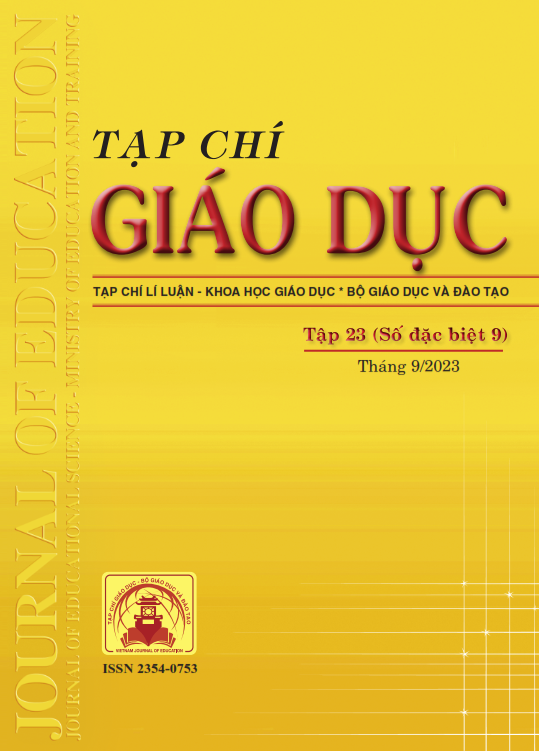Quy trình tổ chức dạy học STEM nhằm phát triển năng lực khoa học tự nhiên cho học sinh trung học cơ sở
- Từ khóa:
- STEM
- Natural Science
- renew
- secondary school
Tóm tắt
STEM education has become a global trend and is one of the methods that many educators are interested in researching. The 2018 general education program has also included STEM in important content to be implemented at all levels. STEM education not only makes lessons more interesting but also helps students form and develop knowledge and skills comprehensively. This article presents the theories of the innovation of teaching Natural Science to the orientation of STEM education in order to develop Natural Science competencies for secondary school students. On the basis of these arguments, the author gives an example of a process of teaching a STEM topic in the Natural Science program. Teaching applying STEM model helps students develop natural science competencies; teachers and educators have more sources of reference in designing lessons as well as developing future research.
Tài liệu tham khảo
Bộ GD-ĐT (2018). Chương trình giáo dục phổ thông môn Khoa học tự nhiên (ban hành kèm theo Thông tư số 32/2018/TT-BGDĐT ngày 26/12/2018 của Bộ trưởng Bộ GD-ĐT).
Bộ GD-ĐT (2020). Công văn 3089/BGDĐT-GDTrH về việc triển khai thực hiện giáo dục STEM trong giáo dục trung học.
Đào Sỹ Nam, Đào Ngọc Chính, Phan Thị Bích Lợi (2018). Một số vấn đề về giáo dục STEM trong nhà trường phổ thông đáp ứng chương trình giáo dục phổ thông mới. Tạp chí Giáo dục, số đặc biệt tháng 9, 25-29.
Hayton, J. C., & McEvoy, G. M. (2006). Competencies in practice: an interview with Hanneke C. Frese. Human Resource Management: Published in Cooperation with the School of Business Administration, The University of Michigan and in alliance with the Society of Human Resources Management, 45(3), 495-500.
Holbrook, J., & Rannikmae, M. (2009). The meaning of scientific literacy. International Journal of Environmental and Science Education, 4(3), 275-288.
PISA (2019). PISA 2018 Assessment and analytical framework. OECD Publishing.
Rychen, D. S., & Tiana, A. (2004). Developing key competencies in education: some lessons from international and national experience. Paris, France: International Bureau of Education.
Sanders, M. (2009). STEM, STEM Education, STEMmania. The Technology Teacher, 20, 20-26.
Zhan, Z., Shen, W., Xu, Z., Niu, S., & You, G. (2022). A bibliometric analysis of the global landscape on STEM education (2004-2021): towards global distribution, subject integration, and research trends. Asia Pacific Journal of Innovation and Entrepreneurship, 16(2), 171-203. https://doi.org/10.1108/APJIE-08-2022-0090
Đã Xuất bản
Cách trích dẫn
Số
Chuyên mục
Giấy phép

Tác phẩm này được cấp phép theo Ghi nhận tác giả của Creative Commons Giấy phép quốc tế 4.0 .












